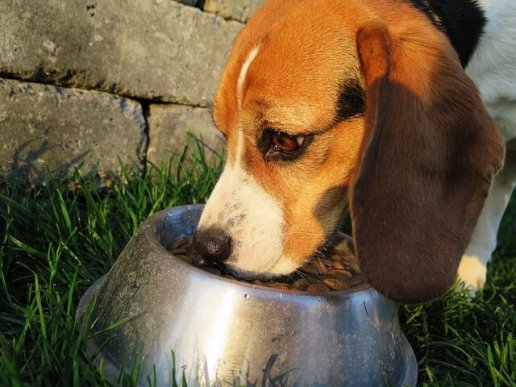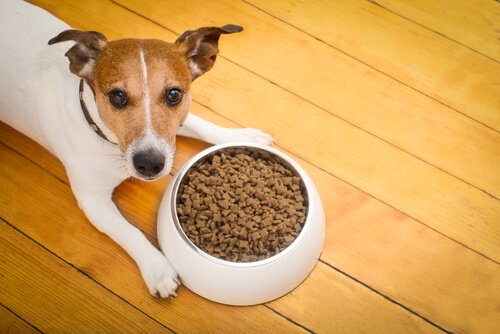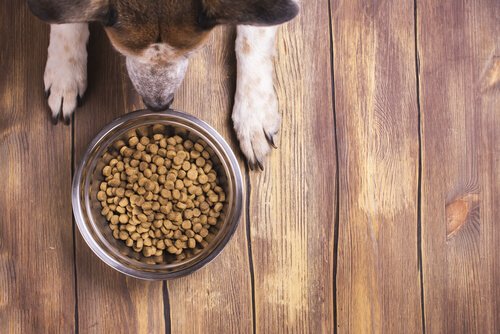What Should You Do if Your Dog Doesn't Eat Dog Food?

Has it been a while since the last time your dog has eaten dog food? Sometimes your dog doesn’t eat their food because they feel like it. But a sudden lack of appetite could be due to several factors.
Without a balanced diet, your dog could get sick. Therefore, when a dog doesn’t eat, their owners should act quickly to prevent any future complications.
Why won’t my dog eat dog food?
Dog food, also known as dog chow, is processed food that’s meant for animal consumption. Dog food is mainly a mixture of different food products that can contain additives and be composed of organic or inorganic substances.
Some dog food is made in such a way that it fully meets an animal’s nutritional requirements. However, there are also foods that complement your pets’ diets.
Therefore, dog food is made with different raw materials and production processes. For this reason, each food is different, so dog owners should be properly informed before choosing what food they will give their dog. The nutritional needs of a puppy from a small breed won’t be the same as a large, elderly dog.

The reasons why a dog won’t eat dog food can be varied. It’s important for owners to observe their dog’s behavior closely. That way, you can notice any unusual behaviors that explain the lack of appetite.
If a dog stops eating completely and stops drinking water at the same time, you should take them to the vet immediately. The sudden lack of food and hydration could be signs of other more serious conditions. Therefore, a professional should be the one to evaluate your dog.
One of the reasons why a dog doesn’t eat is because they have a small wound in their mouth. You should examine your dog’s gums and teeth carefully. If there’s any unusual redness or loose teeth, that would explain why they’re experiencing a lack of appetite.
Make sure you look for any changes in your pet’s appearance. Changes in the texture of their fur, dry nose, or wet eyes might indicate some other condition. Don’t hesitate to contact your veterinarian if your dog has any of them.
Your dog doesn’t eat their food: the dry food has gone bad
The food itself might be the reason why your dog is experiencing a lack of appetite. Therefore, you should check their food to see if the texture is right. Also, check the package to see if it has expired. Smell the food and look at its color. If you suspect that it’s spoiled, then throw it away and buy a new bag.

If you have changed your dog’s food recently, it’s possible that your dog doesn’t want to eat the new food. Also, it’s likely that your dog won’t like the new food’s taste or smell.
Dogs are creatures of habit and routines. Therefore, some dogs prefer to eat the same food all the time and reject any sudden changes. If that’s the case for your dog, then consider mixing the old food with the new one for a few days. That way, the change won’t be so sudden.
Many dogs reject food if they’re used to eating human food, or homemade dog food. Your dog will always prefer homemade food more than dog food.
Some tips to solve a dog’s lack of appetite
If your dog stops eating because there is something wrong with their health, then you should consult with a veterinarian immediately. Some symptoms may be fever, diarrhea, vomiting, constant shaking, dry or too moist mouths and eyes, and pale gums. Don’t hesitate to take them to an emergency consultation.
If your dog doesn’t eat dog food due to the food itself, here are some simple solutions:
- New food. If your dog rejects their new food, try to change their food gradually. Gradually mix the old food with the new food in order to eventually change their food. That way, your dog will get used to his new food gradually.
- Different flavors and smells. Dogs have very sharp senses, especially their sense of smell. That’s why they have favorite flavors. Try to figure out what smells and flavors your dog prefers in order to buy them, the right food.
- Lower or higher levels of fat in the food. Make sure you get food that contains nutritional values similar to that of his old food. This recommendation is only for owners who are changing their dog’s food for reasons unrelated to their health. It doesn’t apply to changes that take place due to a vet’s recommendation.
- Sensitivity to an ingredient. If your dog doesn’t eat their new food even when you have tried to transition it gradually, consider changing their food. It’s possible that your dog is allergic or sensitive to an ingredient in the new food.
[featured-post url=”https://myanimals.com/alternatives-for-dog-food